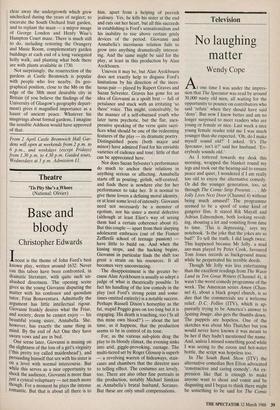Theatre
'Tis Pity She's a Whore (National: Olivier) Base and
bloody
Christopher Edwards
Incest is the theme of John Ford's best known play, written around 1632. Never can this taboo have been confronted, in dramatic literature, with quite such un- abashed directness. The opening scene gives us the young Giovanni disputing the matter with his confessor and quondam tutor, Friar Bonaventura. Admittedly the argument has little intellectual rigour. Giovanni frankly desires what the Friar, and society, deem he cannot enjoy — his beautiful young sister, Annabella. She, however, has exactly the same thing in mind. By the end of Act One they have sworn vows and are in bed.
One scene later, Giovanni is musing on the slightness of the loss of a girl's virginity (this pretty toy called maidenhead'), and Persuading himself that sex with his sister is on . a level with normal intercourse. But While this serves as a nice opportunity to Shock the audience, Giovanni is more than just a cynical voluptuary — not much more though. For a moment he plays the intense romantic. But that is about all there is to him, apart from a helping of peevish jealousy. Yes, he kills his sister at the end and cuts out her heart, but all this succeeds in establishing is Ford's sensationalism and his inability to rise above certain grisly devices of the period. Giovanni and Annabella's incestuous relation fails to grow into anything dramatically interest- ing. And the same might be said for the play, at least in this production by Alan Ayckbourn.
Uneven it may be, but Alan Ayckbourn does not exactly help to disguise Ford's limitations by his direction of the inces- tuous pair — played by Rupert Graves and Suzan Sylvester. Graves has gone for an idea of Giovanni as a spoilt brat — full of petulance and stuck with an irritating `so there' voice. This might, conceivably, be the manner of a self-obsessed youth who later turns psychotic, but the flat, inex- pressive speaking of the verse quite sacri- fices what should be one of the redeeming features of the play — its dramatic poetry. Distinguished poets (both major and minor) have admired Ford for his enviable varieties of cadence and tone; little of that can be appreciated here.
Nor does Suzan Sylvester's performance do much to anchor their relations in anything serious or affecting. Annabella starts off as pouting, girlish, self-centred, and finds there is nowhere else for her performance to take her. It is normal to give these lovers a defining moral identity, or at least some level of intensity. Giovanni need not necessarily be a monster of egotism, nor his sister a moral defective (although at least Eliot's way of seeing them had a certain coherence about it). But this couple — apart from their slurping adolescent embraces (out of the Franco Zeffirelli school of teenage passion) — have little to build on. And when the kissing stops, and the hacking begins, Giovanni in particular finds the shift too great a strain on his resources. It all becomes very unconvincing.
The disappointment is the greater be- cause Alan Ayckbourn is usually so adept a judge of what is theatrically possible. In fact his handling of the low comedy in the play (not Ford's strong point and some- times omitted entirely) is a notable success.
Perhaps Russell Dixon's horseplay as the fat, stupid Poggio goes on too long but it is engaging. His death is touching, too (Is all this mine own blood?') — about the last time, as it happens, that the production seems to be in control of its tone.
For, as the various sub-plots drag the play to its bloody climax, the evening sinks into arid, giggle-provoking, carnage. The multi-tiered set by Roger Glossop is superb — a revolving warren of hideaways, stair- cases and chambers that the director uses to telling effect. The costumes are lovely, too. There are also other fine portraits in the production, notably Michael Simkins as Annabella's brutal husband, Soranzo. But these are only small compensations.


















































 Previous page
Previous page